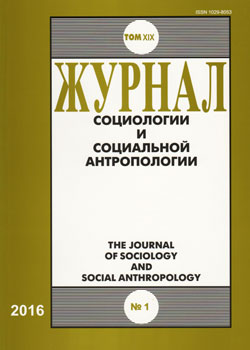Rationality, Rationalization, Rationalism. From Weber to Bourdieu?
Keywords:
rationality, rationalization, rationalism, Weber, Bourdieu, antagonism
Abstract
This is a Russian translation of Hans-Peter Müller. Rationalität, Rationalisierung, Rationalismus. Von Weber zu Bourdieu?, in: A. Maurer, U. Schimank (Hrsg.) Die Rationalitäten des Sozialen. Wiesbaden: VS Verlag, 2011: 43-64. The author analyses approaches of M. Weber and P. Bourdieu in regard to the relationship of rationality, rationalization, and rationalism. Weber focused his interests on Western rationalism, its genesis, universalistic meaning and significance, as well as on its endemic inconsistency. These categories are structural elements of Weber’s sociology: rationality belongs to micro-level, rationalization — to mezzo-level, and rationalism — to macro-level. Weber disclosed mechanism of rational domination over the world which is associated with an insurmountable values antagonism as the main specific feature of modernity.The same categories do not play a central role in Bourdieu writing. Rationality in Bourdieu’s sociology is displaced by economy. The whole of society, not just the economy is subject to economic logic. Bourdieu gave a critical analysis of different fields of rationalized world. He shared Weber’s idea that resistance to the rule of rationalization in the modern world is useless.
Published
2016-02-20
How to Cite
Müller, H.-P. (2016). Rationality, Rationalization, Rationalism. From Weber to Bourdieu? . ZHURNAL SOTSIOLOGII I SOTSIALNOY ANTROPOLOGII (The Journal of Sociology and Social Anthropology), 19(1), 16–42. Retrieved from http://jourssa.ru/jourssa/article/view/455
Section
Sociology: Profession and Vocation

